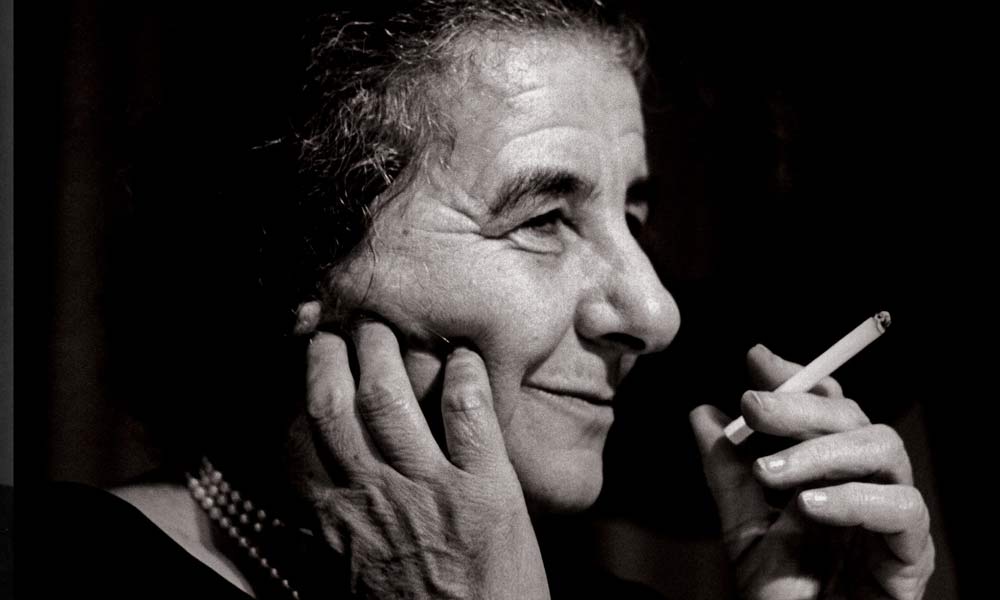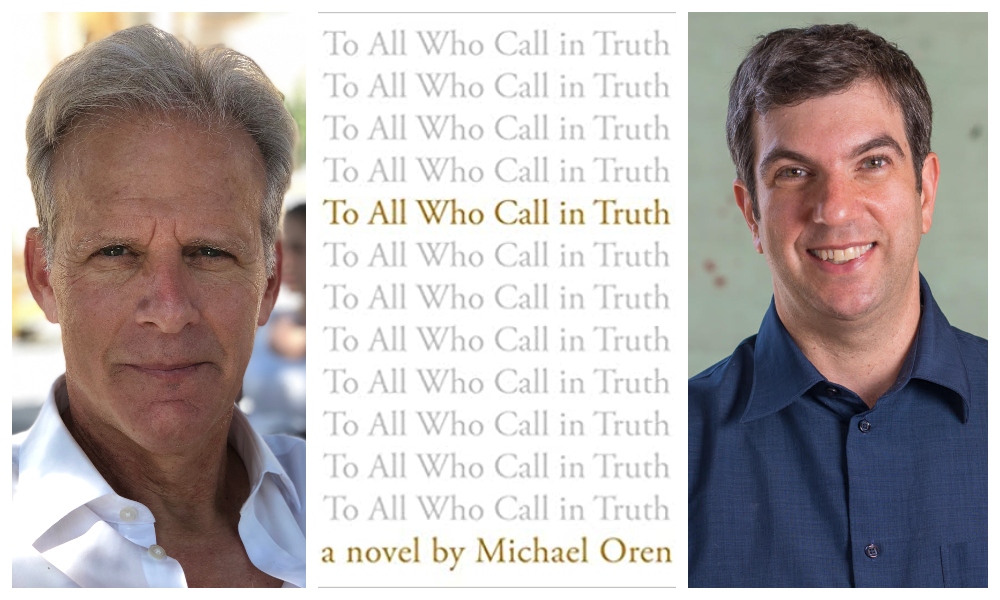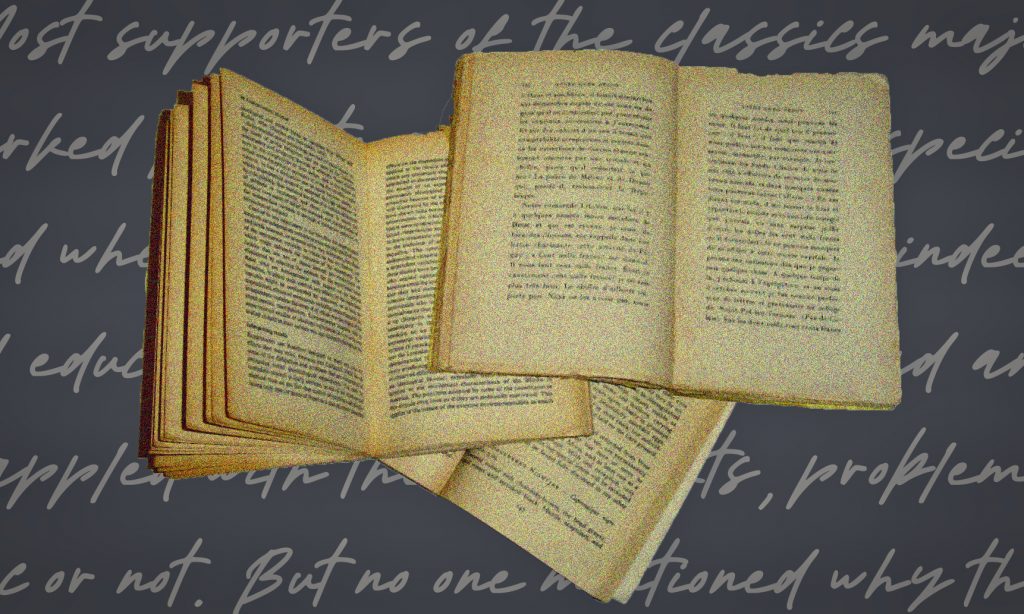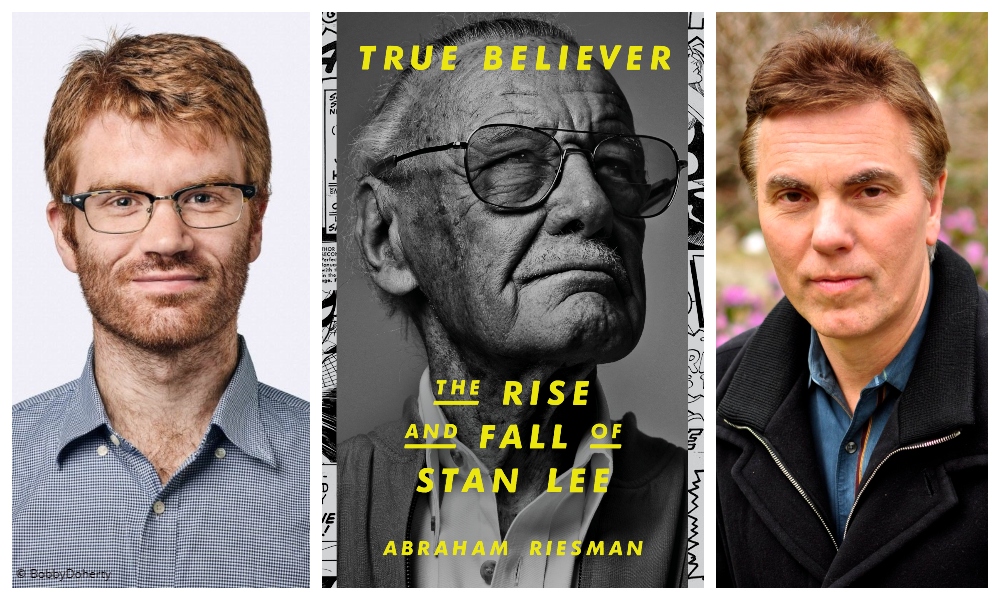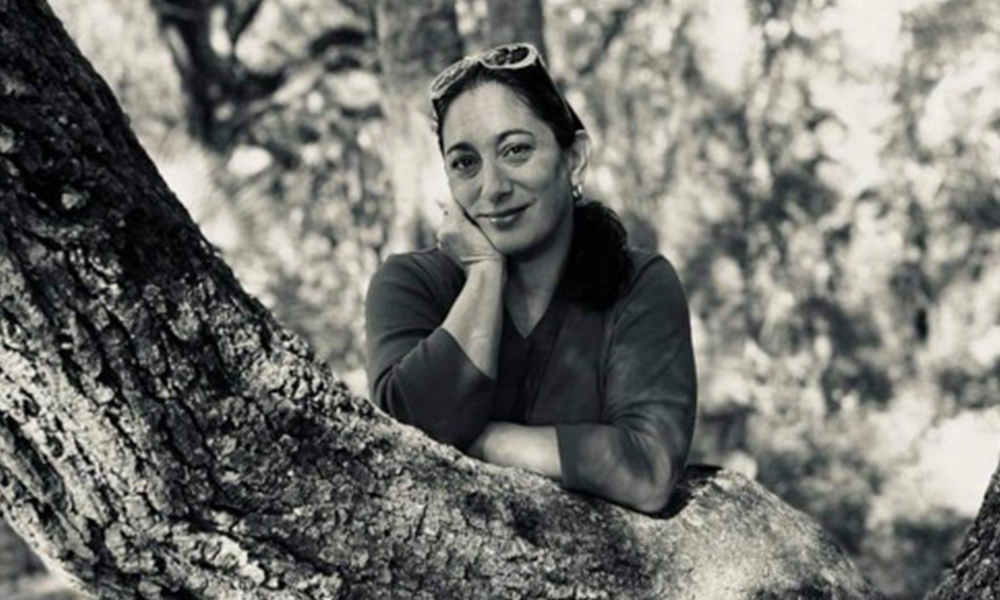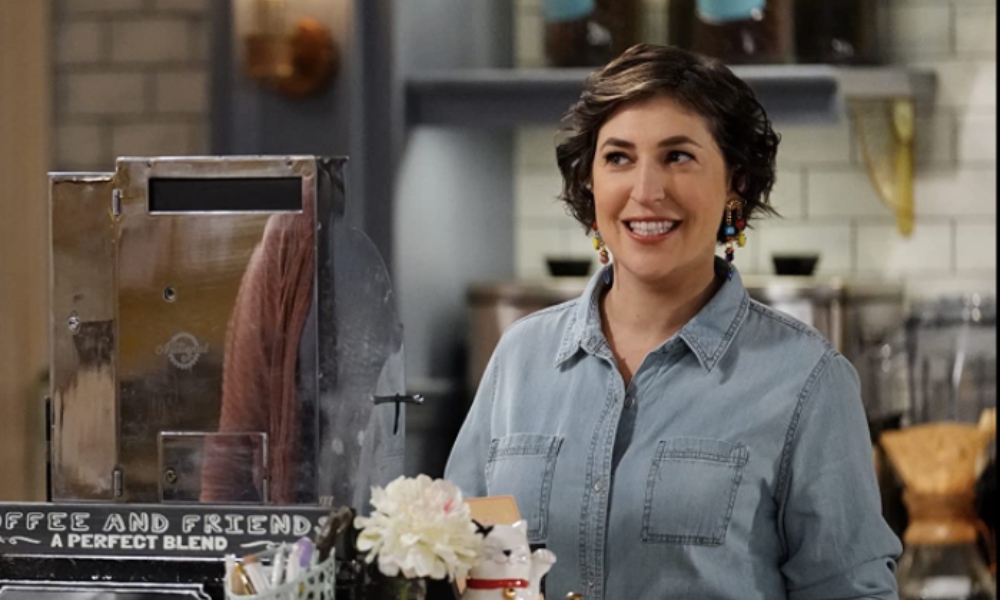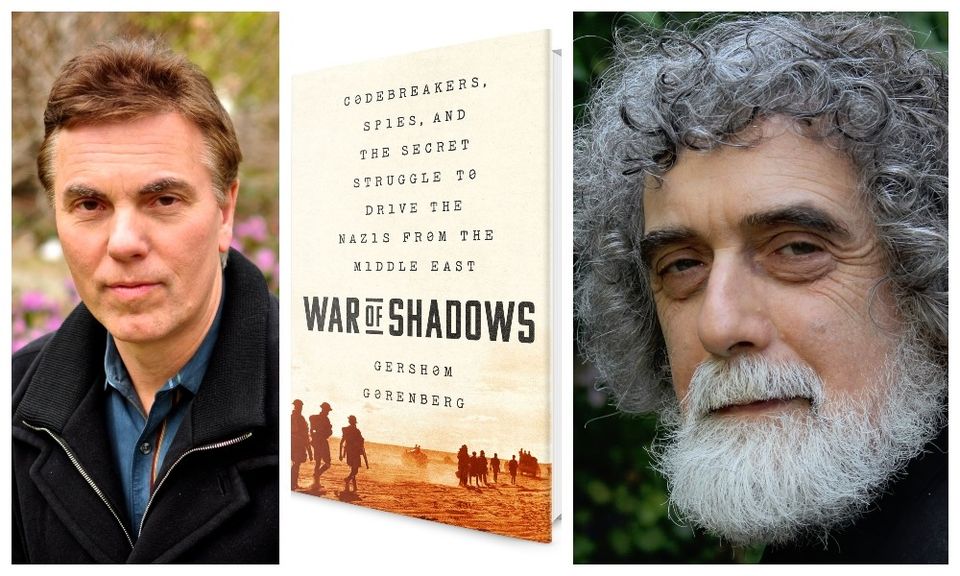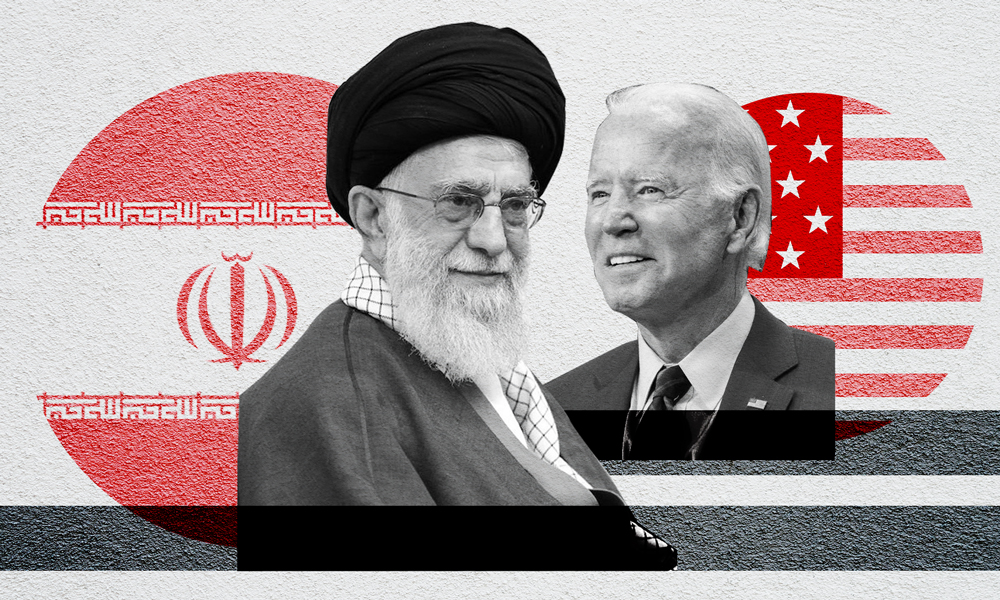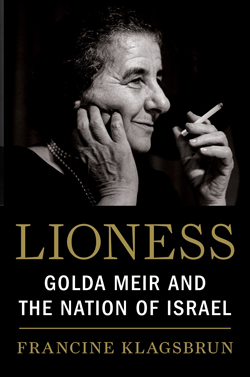
Golda Meir, Israel’s first and only female prime minister, has always provoked strong and gendered reactions. David Ben-Gurion famously said that Meir was “the only man in the cabinet,” and her good friend Richard Nixon said, “she acted like a man and wanted to be treated like a man.” Although she was a trailblazer, second-wave feminists in the 1960s disliked her, and she returned their ire, describing them as “crazy women who burn their bras and…hate men.” Meir resented attempts to turn her into a feminist icon and, despite the fact that her political life had begun in Zionist women’s groups, forcefully stated that she had never belonged to any women’s organizations.
Meir has long fascinated biographers and historians, and as the 120th anniversary of her birth approaches, a slew of publications and events are being planned in her honor. One book in particular has garnered critical acclaim: Francine Klagsbrun’s seminal new biography, Lioness: Golda Meir and the Nation of Israel. This 824-page volume is distinguished by the inclusion of materials from recently declassified American, British and Israeli documents as well as by interviews with Meir’s close associates and both of her children.
Golda Meir was born Goldie Mabovitch in 1898 in Kiev to Moshe Mabovitch, an impoverished carpenter, and his wife, Bluma. One of Meir’s earliest memories was of her father boarding up the family home during the 1905 pogrom, which ultimately killed more than 100 Jews. Fearing further persecution, the Mabovitch family fled to Milwaukee, Wisconsin. Meir prospered in America. At age 10 she founded the American Young Sisters’ Society to raise money to purchase textbooks for the poor, and soon after, she graduated as valedictorian of her junior high. When her parents planned for her to train as a secretary and arranged a marriage for her to a much older man, Meir ran away to join her older sister in Denver and attend high school. It was in her sister’s home that she was first exposed to socialism and Zionism; when she returned to Milwaukee at age 17, she became active in Poalei Zion, “Workers of Zion”—a worldwide movement of Marxist Zionist Jewish workers. Over her parents’ objections, she obtained a teaching certificate in 1917 and then married Morris Meyerson, a sign painter and later a bookkeeper. Enraptured by the idea of a Jewish state, Meir persuaded her reluctant husband to make aliyah. In 1921, the couple set sail for Palestine.
Their initial years in Palestine were challenging. Their application to join Merhavia, an early kibbutz, was rejected twice as they were viewed as overly soft and too American. Once they were accepted on their third attempt, Meir operated threshing machines in the fields, tended to chickens and—much to the bemusement of the other kibbutz members—ironed her clothing every single night. Meir loved kibbutz life, but Morris was unhappy. Three years in, the couple moved to Tel Aviv, where they had a son (Menachem), and then to Jerusalem, where their daughter (Sarah) was born.
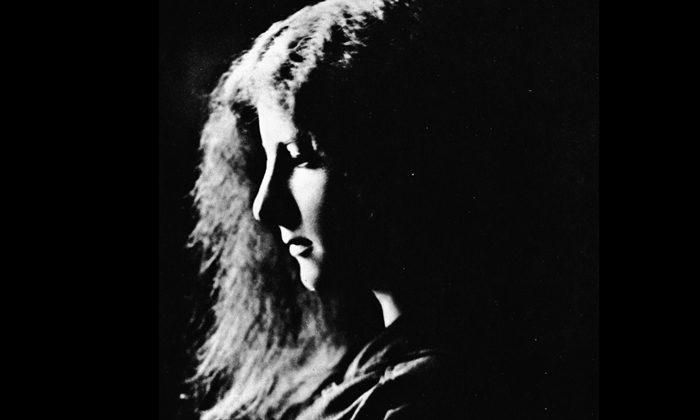
Golda had a picture taken by a professional photographer while attending the first American Jewish Congress in Philadelphia in 1918.
In Jerusalem Meir first entered public life in 1928 by becoming secretary of the Women’s Labor Council, then serving on the Executive Committee of Histadrut (the General Federation of Labor) and as a delegate to the World Zionist Organization. During World War II, Meir emerged as an effective spokesperson for the Zionist movement and a passionate advocate for the Jews of Europe. Shortly before the 1948 formation of the State of Israel, her friend David Ben-Gurion sent Meir, disguised as an Arab, on a clandestine mission to persuade King Abdullah of Jordan not to attack Israel. The plan didn’t work, but she returned to sign the Israeli Declaration of Independence. During a post-independence push for Israeli leaders to Hebraicize their names, Goldie Meyerson changed hers to Golda Meir, meaning “to illuminate” or “burn brightly.”
In many ways, Meir was more a product of the Zionist enterprise than a creator of it. Unlike Ben-Gurion, she was not a visionary; also in contrast to her male colleagues, she had never had the opportunity for a serious Jewish education. Religion did not interest her and, other than frequently expressing annoyance with rabbis, she virtually ignored that aspect of the Jewish state. She was a devout socialist with a strong belief in the redemptive power of labor. She herself was a doer and a workhorse with a single-minded commitment to the Zionist cause. As minister of labor from 1949 to 1956, she created one of the most progressive social security programs in the world. During the following decade, Meir served as minister of foreign affairs, the only woman at that time to hold that job.

Golda and husband Morris Meyerson after their wedding in 1917.
In 1969, Meir became the world’s third female prime minister. The first two—India’s Indira Gandhi and Ceylon’s Sirimavo Bandaranaike—ascended to power following the deaths of their father and husband, respectively. Meir paved her own way. She was extremely popular; she had a nearly 90 percent approval rating in Israel the day she took office. Then came the 1973 Yom Kippur War. Israel was taken by surprise when a coalition of Arab states led by Egypt and Syria attacked. Although Israel ultimately prevailed, most Israelis blamed Meir and her government for being caught unprepared and for the deaths of more than 2,500 Israeli soldiers. Within months, she was forced out of office, her legacy in Israel permanently tarnished. Outside Israel, however, Meir remained revered: American libraries and schools are named for her; she is the subject of popular children’s stories, plays and books.
Klagsbrun argues that Meir should not be defined by the 1973 War alone and that she deserves more credit for her earlier accomplishments. Additionally, Klagsbrun contends that Meir has been judged by a double standard throughout her life because she was a woman. Previously known for her passionate advocacy for women in the Jewish community and for editing the 1972 children’s classic Free to Be…You and Me, Lioness is Klagsbrun’s first venture into Israeli history. Moment speaks with Klagsbrun to discuss her revisionist take on Meir—or Golda, as Klagsbrun calls her, following Meir’s own preference.
Do you agree with the common Israeli viewpoint that Golda Meir failed the country during the 1973 Yom Kippur War?
Not entirely. Golda has not received enough credit for her nerve and determination during and immediately after the 1973 War. Defense Minister Moshe Dayan fell apart during the war. Golda really held the country together. She made important military decisions. But even so, she was ultimately held responsible for the war happening and was not forgiven.
Was her gender a factor in this?
Yes. I believe there is a misogynistic and sexist thread to this. As a woman, she was more vulnerable and attacked more. Additionally, because she was female, she had not been a general. When men wrote about her after her death, they turned her positive attributes around: Her strength became known as arrogance, and her self-confidence was rewritten as self-righteousness.
Overall, how would you describe Golda Meir’s leadership style, and how did it differ from those of leaders who had come before?
Golda combined a grandmotherly style with tough-as-steel determination. She could get her way with world leaders, for example, with humor and warmth that caught them off guard, but also with unbudging insistence when it came to Israel’s security. She was often accused of being stubborn and intransigent in security matters. In fact, she was able to compromise when she felt it necessary but held out as long as she could for positions she believed in.
She never denied her femininity. She didn’t hide her tears when they welled up—and at times she used tears to get what she wanted. She took almost every military loss personally, as though the casualty was her own family member, and made a point of visiting wounded soldiers in the hospital and the families of the fallen at home. She also had a knack for making small talk with ordinary people, which won her many fans during her years of highest popularity. And she had the ability to remain calm and focused during national crises, such as the Yom Kippur War, which inspired confidence in the nation as a whole.
Previous leaders were men, and their styles differed from her warm, homey one. Prime Minister Ben-Gurion did not connect with people as she did; he was seen as the father of the country, sterner and more distant, as a father in those days might have been. Prime Minister Levi Eshkol had a wonderful sense of humor, but he seemed weaker than Golda, lacking her strength and powerful will. Prime Minister Moshe Sharett was colder and more intellectual than she. Nor did any of the men have the natural charisma she had.
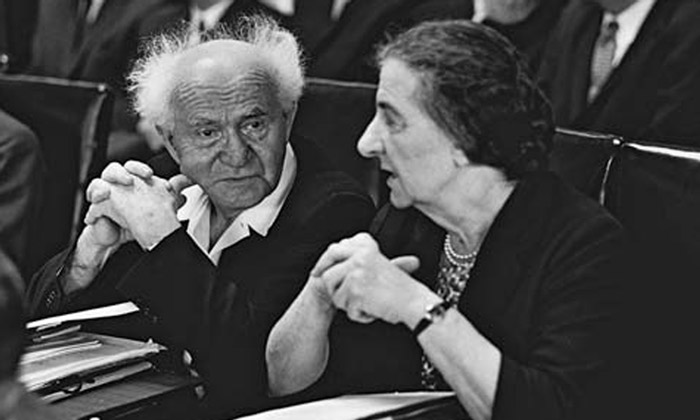
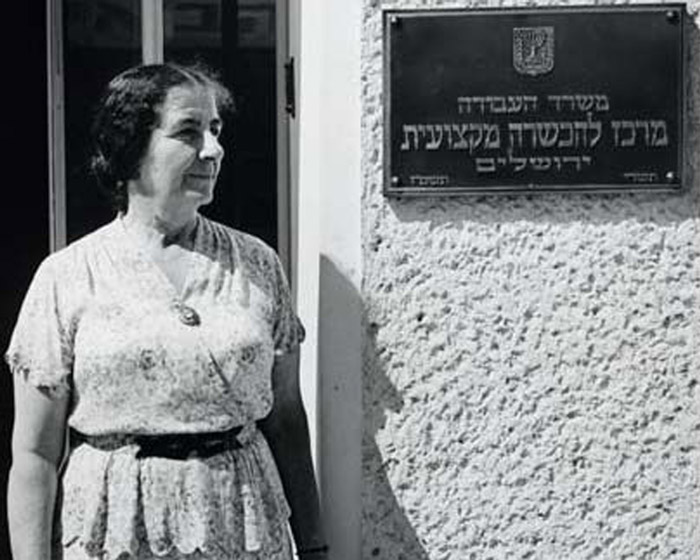
Top: Seated with David Ben-Gurion in the Knesset in 1962. Bottom: Outside the Vocational Training Center in Jerusalem in 1955
How was she viewed by her male peers?
She got along well with many of them. For instance, she and Ben-Gurion worked well together until they had a falling out. But even he would say, “She’s a great woman, but she’s a woman.” Young men who worked for her said they found it challenging, because she could be very sarcastic and was known to hold a grudge forever. Many other male employees said that she could be cruel and that it was difficult to work for her. I don’t know if they would have said the same things about a man with the exact same qualities. Israel was a very male-oriented society; these men were not used to having a powerful female boss. Her reception in Europe was also uneven. In 1956, before the Suez War began, Golda went to France with a group of male Israeli leaders. The French thought she looked like an old ugly secretary and made fun of her appearance in the press. The Israeli men with her made no effort to come to her defense. There were a lot of these kinds of occurrences in her life. At the same time, there certainly were men who respected her.
Why didn’t Meir identify herself as a female leader or a feminist?
She made a big point of not seeing herself as a feminist and of not identifying with the feminist movement because that was not to her benefit. It was not going to help her become the head of a male-oriented and misogynistic society. Also, she was a socialist. She believed that in a socialist society, you would not need a women’s movement because everyone would be taken care of and everyone would be equal. She spoke of herself as a leader, not a women’s leader. When she became prime minister, reporters would ask her how it felt to be the only woman prime minister in the entire world. She would say, “I don’t know. I never was a man. This is who I am. Don’t separate me as a woman. I am a person. I am a leader and that is how I should be seen.” She cared about women’s issues, though. When she was labor minister, she pushed through laws supporting working women, including providing free hospitalization when they had children and paid maternity leave.
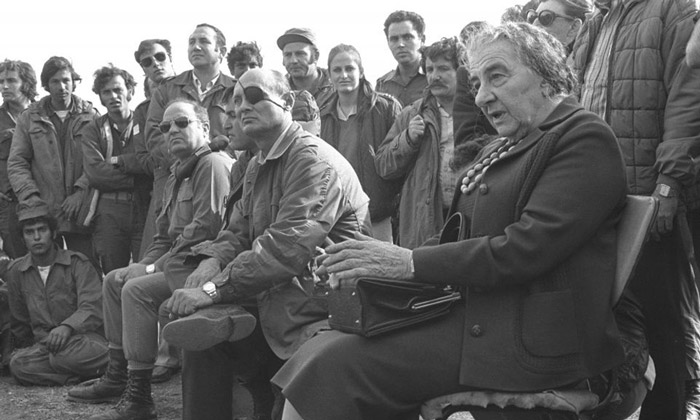
Golda Meir and Defense Minister Moshe Dayan meeting with troops on the Golan Heights in 1973.
Why were there so few Israeli women in leadership roles in Israel in the decades after Golda Meir?
Partly because she was unique. Also, she did not go out of her way to help other women. She helped certain individual women—Zina Harman joined the Knesset because of Golda, and Esther Herlitz became an ambassador because of her. But in general, she did not open the way for other individual women or women as a group to get ahead.
How do you think Golda Meir would view the current state of Israel?
What would she see as its strengths and weaknesses? What would surprise her most? She would not approve of the current Israeli government or of the great power that the religious right has and continues to accumulate. She was a secular Zionist. She wanted to build a state for the Jewish people that was like all the other states of the world. It was not her intention for it to be a religious state. She did not believe in the greater Israel or that Israel had to conquer, own or keep control of all of Palestine. She felt after the 1967 War that the conquered and captured lands should be used as bargaining points for Israel to trade land for peace. She was not willing to give everything back because she wanted more secure borders, but she was not in favor of Israel keeping control of the entire West Bank. She would have negotiated most of the West Bank away in exchange for peace. She certainly was not a lover of the Arabs or Palestinians, but she was also very pragmatic. I believe that over time she, like Yitzhak Rabin, would have made a deal with the Palestinians and given them their state.

